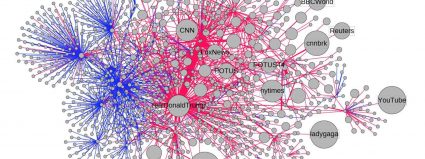During the 2016 US election cycle, artificial intelligence was wildly successful at spreading lies and propaganda. These researchers suggest weaponizing better bots and aiming them in the opposite direction.
“Bots spread a lot of fakery during the 2016 election. But they can also debunk it.”
by Daniel Funke
November 20, 2018
Poynter
 Aside from their role in amplifying the reach of misinformation, bots also play a critical role in getting it off the ground in the first place. According to the study, bots were likely to amplify false tweets right after they were posted, before they went viral. Then users shared them because it looked like a lot of people already had.
Aside from their role in amplifying the reach of misinformation, bots also play a critical role in getting it off the ground in the first place. According to the study, bots were likely to amplify false tweets right after they were posted, before they went viral. Then users shared them because it looked like a lot of people already had.
“People tend to put greater trust in messages that appear to originate from many people,” said co-author Giovanni Luca Ciampaglia, an assistant professor of computer science at the University of South Florida, in the press release. “Bots prey upon this trust by making messages seem so popular that real people are tricked into spreading their messages for them.”
The study suggests Twitter curb the number of automated accounts on social media to cut down on the amplification of misinformation. The company has made some progress toward this end, suspending more than 70 million accounts in May and June alone. More recently, the company took down a bot network that pushed pro-Saudi views about the disappearance of Jamal Khashoggi and started letting users report potential fake accounts.
Nonetheless, bots are still wrecking havoc on Twitter — and some aren’t used for spreading misinformation at all. So what should fact-checkers do to combat their role in spreading misinformation?
Tai Nalon has spent the better part of the past year trying to answer that question — and her answer is to beat the bots at their own game.
“I think artificial intelligence is the only way to tackle misinformation, and we have to build bots to tackle misinformation,” said the director of Aos Fatos, a Brazilian fact-checking project. “(Journalists) have to reach the people where they are reading the news. Now in Brazil, they are reading on social media and on WhatsApp. So why not be there and automate processes using the same tools the bad guys use?” Read more.
